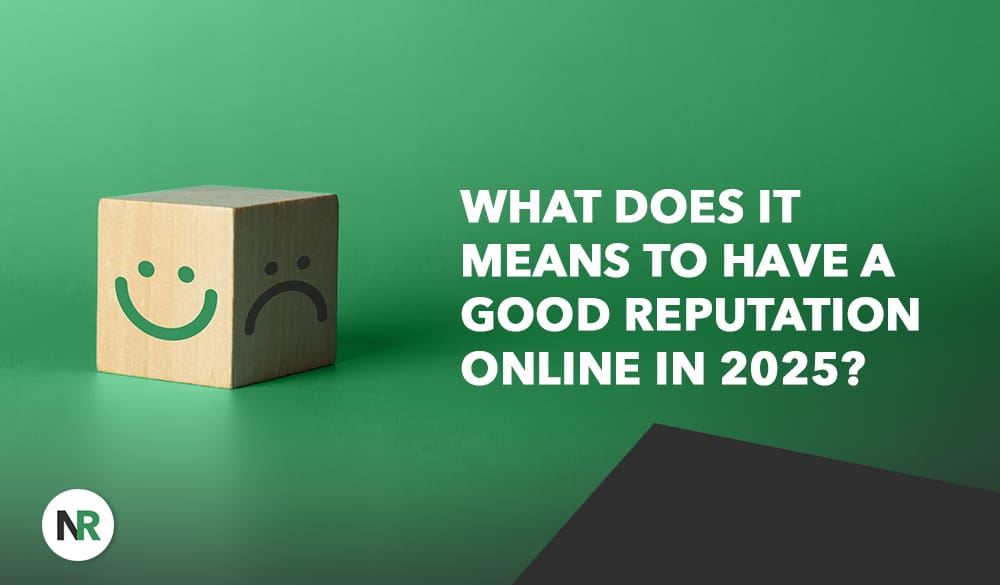As a business owner or public figure, you’re probably wondering, “What does it mean — and what does it take — to have a good reputation online?”
In today’s connected digital environment, your company’s reputation can help or hinder your business prospects. A good reputation is essential to ensure continued success in your industry.
Business owners know that building trust is one of the foundations of operating a successful company. Trust is formed partly on customers’ perceptions of you, your business, and the products or services you offer.
The consensus public perception of your company in the digital environment is known as your online reputation. A good reputation opens new doors of opportunity, while a bad reputation can stand between you and business growth.
In this guide, we will explore why your business reputation is so valuable and share details about online reputation management, including how it can improve brand awareness, online visibility, and customer trust.
NetReputation provides information and services to help you protect your digital presence. Call us at 844-461-3632 to learn more, or fill out the contact form below for a free consultation.
Request a Free Consultation
Your Company’s Reputation in the Digital Environment
When potential customers are searching online, what information are they finding about you in search results?
It’s a fact of modern life that one of the first tools people turn to in order to learn about businesses in their area is the web. Google searches account for billions of queries each day, and a significant percentage of these are searches for business information.
With unhindered access to the world’s information on the web, the search results people discover when researching businesses can have a profound effect on their behaviors. In the digital world, a good reputation has tremendous value, serving to extend your digital marketing efforts and ultimately leading to lower marketing costs.
In simple terms, a positive reputation is one of the most valuable intangible assets a business can have, especially in the digital environment.
How is a Good Reputation Formed?
Remember that your online reputation is a consensus of public opinion. In essence, it is the average of consumer thoughts about your business. How is a good reputation formed, though?
The answer begins with search results. Most people begin with a search on Google. The results presented to users based on a search query are pulled from a wide range of sources, including:
- News articles
- Social media mentions
- Online reviews
- Customer ratings and testimonials
- Images
- Business listings
If the information in search results is positive, your company has built a positive reputation or a favorable opinion of you, your employees, and your business practices.
It is important to note that because more than 93% of people read online reviews before making purchasing decisions, your reputation is critical. Online reviews have become as important as word-of-mouth recommendations by friends and family. If your reputation is struggling to overcome negative information, you may be missing out on customers.
It’s not quite that simple, of course. Behind the scenes, using search engine optimization, online reputation management, and digital marketing practices to build brand awareness also helps shape your digital reputation. Still, search results form the foundation of a good reputation, and maintaining positive search results is a critical aspect of the modern business environment.
Advantages of a Strong Business Reputation
How can a good reputation help your business? Consider the following:
- A positive reputation improves trust in your company and brand.
- A good reputation reinforces customer loyalty.
- A favorable reputation improves brand recognition.
- Your good reputation helps to lower costs associated with advertising.
From an employer perspective, a favorable reputation helps to attract top talent to your organization. People want to work for companies they can trust and those they can be proud of. Companies that leverage their reputations have long enjoyed the recruitment and retention powers that come with this strategy.
As mentioned in a previous section, reputation management works in concert with digital marketing practices to help get your business name in front of the people who matter most: your customers. By building, maintaining, and preserving a positive reputation, you are positioning your company for increased revenue as well as growth opportunities.
Risks of a Bad Reputation
Just as a good reputation can have positive effects on your brand’s ability to connect with customers, a bad reputation can create an unfavorable perception of your business. Many factors can affect reputation, including poor reviews, negative mentions on social media, and unflattering news items or images circulated on the web.
An unfavorable reputation can result in customers turning to your competitors for their business needs. This risk alone can upend your plans for business expansion and revenue growth.
Consider these alarming statistics to gain an understanding of how damaging a bad reputation can be:
- Negative reviews can drive pricing down, shutting you out of revenue growth.
- Businesses face customer losses in excess of 22% if a single negative article is found in search results.
- Three or more negative items in search results can result in a 59% loss of customers.
Can your business afford the risks associated with a bad reputation? If not, reputation management can help you build, preserve, and restore positive opinions about your business in the online environment.
You can take control of your online reputation, whether you’re working on your personal reputation or your professional digital presence. Call us at 844-461-3632 for more information.
Is Having a Solid Reputation Important for Individuals?
You already know that reputation is important for your brand, customer trust, and more, but does it play a crucial role in a person’s life, too?
Yes, it does!
Whether you’re a well-known public figure or not, chances are that you have some sort of digital presence. When it comes to individuals, reputation is important because it can lead us to opportunities or prevent us from moving forward.
From friends and romantic partners to jobs, education and more, having a strong reputation can be a help in many ways.
Personal Reputation and Maslow’s Hierarchy of Needs
According to the motivational psychology theory of the Hierarchy of Needs, humans have an abundance of needs that start with the basics and evolve as you go up the pyramid.
The most basic needs are:
- Food
- Rest
- Safety
- Security
- Warmth
- Water
These are physiological requirements for survival. Once those needs are met, people are able to focus on psychological needs, including:
- Feeling of accomplishment
- Friendships
- Intimate relationships
- Prestige
- Self-esteem
This is where having a strong reputation matters. Being viewed favorably by the public can improve feelings of achievement, an individual’s self-esteem, and the person’s acknowledgment of their potential.
Is Reputation the Same as Character?
While the terms “reputation” and “character” are often used interchangeably, they have different meanings.
An individual’s character refers to their moral values and intrinsic qualities. This is separate from any beliefs or opinions the general public holds about the individual.
In other words, the term character refers to who a person is inside, including their history of actions and their personal beliefs.
On the other hand, an individual’s reputation is a reflection of how others view the person. It may or may not be a true reflection of the individual’s character.
Whether or not a person has a strong reputation depends on the experiences, opinions and even biases of others.
How Personal Reputation and Business Reputation Are Related
Putting in consistent effort to build a good personal reputation can also help your brand’s online reputation. This is especially true for business leaders and entrepreneurs who work hard to protect and improve their personal reputations. Here’s how your glowing personal reputation can buoy your company’s reputation, too:
- Brand Image: When someone who’s well-liked and has a good professional reputation is the face of your company, it instantly elevates your brand image. This can give your company a competitive edge, too.
- Credibility and Trust: A person with a great online reputation is more credible and trustworthy, and this can directly impact your business, too. Potential customers will see a strong leader at the helm of a company and, as a result, trust the business, too. With trust comes perks like customer loyalty and positive word-of-mouth marketing.
- Networking Opportunities: A respected and admired business leader will get lots of business opportunities coming their way, including collaborations and partnerships. These networking connections can expand the brand’s reach, help forge strong partnerships, and bring in new clients.
- Talent Attraction: Executives with great reputations are like magnets for top talent. Smart, savvy job candidates will be after a position at your company. Having so many options makes it easy to pick the best candidates for the team.
Having a positive personal reputation is a valuable business asset that elevates your brand, company and team. At NetReputation, we work with individuals and businesses to help them build and take control of their online reputation. Give us a call at 844-461-3632 to learn more.
What is Online Reputation Management?
Whether your reputation is already positive or negative, online reputation management can help you unlock more business opportunities.
Reputation management is the practice of shaping public perception through the use of digital marketing, SEO, and public relations. Reputation management professionals utilize a wide range of customized services to build brand awareness and trust between a company and its customers. Just like traditional advertising, ORM can ultimately result in greater revenues while engaging with the consumers that help your business grow.
Firms specializing in ORM can give you advantages over your competitors. In the next sections, we will explore how brands can get the most out of this essential advertising tool.
Building a Good Reputation Online
Now that we have illustrated the importance of and the benefits associated with a great reputation, how can business owners take advantage of this powerful tool?
Reputation management companies have a broad range of strategies and services. While the approach differs between service providers, the leading ORM firms use a five-part process to establish, reinforce, and repair critical business reputations for their clients:
Reputation Analysis
The first part of any ORM campaign is to analyze a company’s existing reputation. In this focused analysis, ORM professionals pinpoint the ideal client base, look for negative details that are harming one’s reputation, and identify opportunities for differentiating you from your competitors. The data collected in the analysis phase is used to develop impactful strategies for the next parts of the process.
Web Property Development
Your digital footprint has a powerful effect on consumer purchasing behavior. Whether your business is just starting out or you want to spread the word about your operations, having a robust and visible footprint is key to connecting with your customers. ORM professionals get to work developing web properties designed to improve your online visibility. Examples include:
- Professional websites
- Video profiles
- Social media profiles
- Business directory listings
- Wikipedia pages
- Blogs
These web properties will be leveraged in the next phase, allowing your business to stand out on the web.
Content Creation
There’s a good reason that web properties are developed for a reputation management campaign. These properties give ORM professionals the platforms needed to communicate directly with customers, establishing or expanding your digital reputation. Content creation is perhaps the most important aspect of a robust ORM strategy; this content improves visibility in search results by focusing on SEO. As content is created, it is posted on the properties that you own or on third-party websites. Examples of content created for ORM include:
- Social media posts
- Press releases
- Interviews
- Video and slideshow content
- Executive bios and employee profiles
More examples include thought leadership articles, white papers, and reports. These pieces of content can help build authority for your company in its industry niche while building trust between you and your consumers.
Publishing
Now that content has been created, publishing is the next phase in the reputation management process. Content is published on a regular schedule to boost engagement and to ensure great visibility in search results. From Facebook posts to blogs and industry articles, publishing your positive content puts you right in front of your customers and keeps your ORM campaign on track.
Content Promotion
As the leading ORM company, NetReputation knows that content promotion is the key to building, improving, or repairing your web reputation. ORM teams use a combination of owned promotion, earned promotion, and paid promotion strategies to grow your audience.
Public relations is another valuable service designed to put you in front of your customers. By building engagement, your campaign is assured of success.
Protecting Your Reputation
With online reputation management, you gain significant competitive advantages in your market. No matter how strong your reputation is, however, it is always at risk of damage. One single news article or other negative item in search results can erode the trust you’ve built in the digital environment.
To protect your reputation, the process of reputation monitoring is crucial. This monitoring uses automated tools to scour the web for any mention of you or your business. Monitoring allows you to identify potential threats before they can cause harm. There’s a good reason for monitoring: This proactive approach is the hallmark of a robust brand; monitoring will provide information you need to remain at the forefront of your market.
Repairing a Damaged Business Reputation
If negative information such as news articles, bad reviews, or unflattering customer feedback has damaged your reputation, what can you do to recover? ORM is the solution. While the approach differs between campaigns and is influenced by the reputational damage you have experienced, repairing your digital reputation uses many of the same components as illustrated above.
Repair begins with identifying the threats that have damaged your digital footprint. Then, these negative items can be targeted for removal. If bad reviews or news articles cannot be removed from search results, content creation works to push those results off the first page of Google searches. Continued monitoring ensures that your reputation is protected against any risk.
Contact NetReputation Today
Are you ready to take your business to the next level? Struggling to build brand awareness and don’t know where to turn for help? NetReputation is ready to assist you.
At NetReputation, we provide a broad range of services to individuals and businesses who want to create, grow or repair their digital reputation. Whether you’re prioritizing your personal or professional online reputation, our solutions and team of experts can help.
Our reputation management professionals have helped thousands of business owners and individual clients since 2014. Companies of all sizes and types have been able to benefit from our customized services. We apply cutting-edge practices and proven strategies to help brands succeed.
Call NetReputation today at 844-461-3632 or complete the form below for a free consultation.










